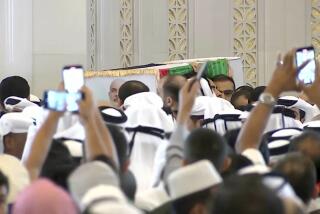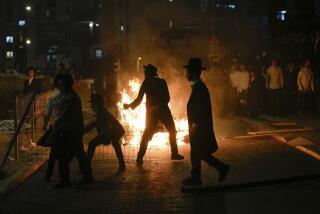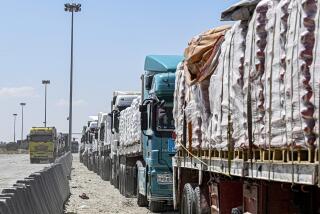Egyptian troops, protesters clash ahead of Sunday celebrations
- Share via
CAIRO — Clashes between Egyptian security forces and supporters of the Muslim Brotherhood flared Friday near Cairo’s Tahrir Square and several other locales, reviving bitter animosities that have simmered in the seven weeks since the army and police killed hundreds of supporters of deposed Islamist President Mohamed Morsi.
Friday’s fighting, reported to have claimed at least one life, could presage larger-scale confrontations on Sunday, when Egypt’s powerful military stages self-laudatory commemorations of the 40th anniversary of one of its greatest modern-day battlefield triumphs.
Muslim Brotherhood backers have vowed to take to the streets on the same day -- and at some of the same sites -- to express fury and disdain for the army-backed interim government.
Barbed wire and tanks ringed Tahrir Square, scene of the enormous protests that toppled longtime autocrat Hosni Mubarak in 2011. The square is an iconic symbol to the architects of that revolution, most of whom also lent their support to the July 3 military coup that removed Morsi from office.
Morsi, like most of the leadership of the Muslim Brotherhood and thousands of its followers, is in jail. The organization is formally banned, and the government has begun the task of untangling and seizing its assets. Brotherhood partisans, with diminishing international support, continue to demand the former president’s reinstatement.
Morsi followers tried earlier this week to breach Tahrir Square and were repelled by security forces, merchants and residents. On Friday morning, a few hours before the latest confrontation, plainclothes police bunched menacingly at one of the square’s many entrances, a few yards from a ring of tanks.
“They won’t be getting in this way,” one of the officers said grimly. An old woman seated on a rickety chair waved a large Egyptian flag and brandished a portrait of Gen. Abdel Fattah Sisi, who led the July coup.
An overpowering security presence did not prevent Morsi supporters from staging protests around the center of Cairo. Police fired tear gas and live ammunition into the air to repel them; some demonstrators responded with volleys of rocks and bottles. The melee in turn yielded massive horn-honking traffic jams that brought much of the city to a standstill.
In addition to sealing off Tahrir Square, authorities blocked access to areas where the mid-August crackdown on pro-Brotherhood demonstrators took place. Pro-Brotherhood marchers distributed “martyr fliers” with pictures of those who died in August’s protests, which were centered at Rabaa al Adawiya mosque.
Sunday’s military commemorations are to mark the Egyptian army’s 1973 drive across the Suez Canal and into the Sinai peninsula, which had been occupied by Israel since the 1967 Middle East War. Striking on the eve of the most solemn Jewish holiday, Yom Kippur, Egyptian forces initially breached Israel’s defenses but eventually were driven back, with the Israelis recrossing the Suez and pushing to within 60 miles of Cairo.
The conflict ultimately led to a cease-fire, the Camp David accords and Israel’s withdrawal from the Sinai.
The army is a revered institution in Egypt, and its commemorations of the 1973 war are generally greeted with an enthusiastic show of public support. Television channels all week have carried grainy footage of Egyptian troops scrambling across pontoon bridges and using high-pressure hoses to demolish defensive sand berms erected by the Israelis. Days before the anniversary, Egyptian fighter jets staged screaming flyovers that rattled windows and nerves across the capital.
Mindful of that patriotic sentiment, the Muslim Brotherhood appeared to be trying to make clear that its quarrel is very much with the present-day army chief, Sisi, rather than with that storied legacy. The Brotherhood’s Freedom and Justice Party, on its website, paid tribute to the “heroes” of the 1973 offensive.
Elsewhere, there were signs of an intensifying faceoff between the army and Islamists. Machine gun-wielding assailants on Friday fired on an armored personnel carrier on the road linking the capital and the Suez Canal city of Ismailia, killing two soldiers and wounding two others, state media reported.
The army for the last month has been in the midst of a major offensive against Islamist militants in the Sinai peninsula. But some clashes have occurred closer to the capital, including fighting last month in towns in the Nile Valley and on the outskirts of Cairo.
In the wake of the early-morning shooting, troops backed by helicopters swarmed villages near the scene of the attack. The official MENA news agency said two of the assailants were captured and that about half a dozen others more were being sought.
ALSO:
Four killed in Kenyan riots after slaying of Islamic cleric
Cancellation of Obama’s Southeast Asia trip a boost for China’s Xi
War, poverty, repression: Why so many Africans risk their lives to migrate
Hassieb is a special correspondent.
More to Read
Sign up for Essential California
The most important California stories and recommendations in your inbox every morning.
You may occasionally receive promotional content from the Los Angeles Times.










